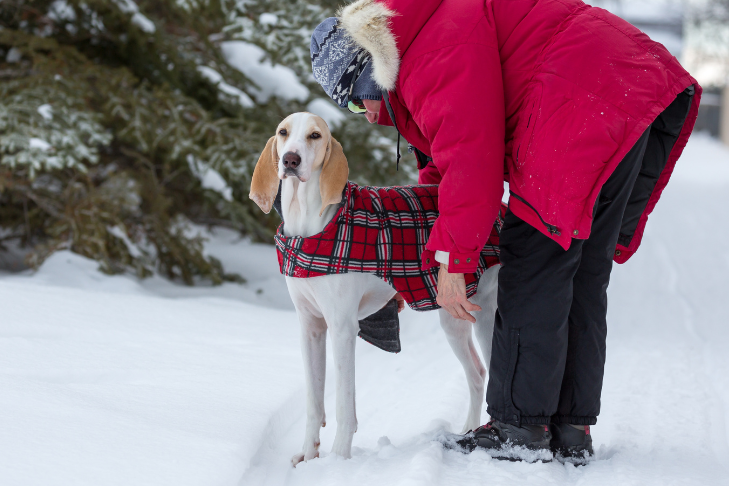Keeping Senior Dogs Comfortable in Winter: Tips for a Cozy Season

As the temperatures drop and winter weather creeps in, it’s essential to remember that our senior canine companions require extra care to stay comfortable and healthy during this chilly season. Older dogs are often more susceptible to the cold and its associated health risks. We’ll explore some crucial tips to ensure your senior dog remains warm, safe, and comfortable throughout the winter months.
-
Indoor Comfort and Warmth
First and foremost, ensure your senior dog has a warm and cozy indoor space. Here are some considerations:
- Bedding: Provide your senior dog with a comfortable and well-padded bed away from drafts. Older dogs may have joint issues, so orthopedic beds can offer extra support and comfort.
- Heating: If your home gets particularly cold, consider using additional heaters or heated pet pads to keep your dog warm. Ensure these are safe and supervised.
- Blankets: Provide your dog with a warm, soft blanket when they are resting or sleeping. Make sure it’s easily washable, as senior dogs may have accidents.
-
Winter Apparel
Just like humans, dogs benefit from winter clothing. For senior dogs, keeping them warm is crucial. Consider:
- Dog Sweaters or Coats: These can provide extra insulation and protect your senior dog from the cold. Measure your dog for the right fit to ensure comfort and freedom of movement.
- Boots: Protect your dog’s paws from the cold ground and potentially harmful substances like salt and de-icers. Dog boots can be a great solution for this.
-
Maintaining a Healthy Diet and Hydration
Senior dogs often have different dietary needs. During winter, keep these considerations in mind:
- High-Quality Food: Ensure your senior dog is on a nutritionally balanced diet appropriate for their age and size. Good nutrition is essential for maintaining their overall health and warmth.
- Stay Hydrated: Cold weather can lead to dehydration. Keep fresh water available at all times and monitor your dog’s water intake. Some senior dogs may prefer slightly warmed water.
-
Regular Exercise and Indoor Activities
Cold weather should not deter you from maintaining your senior dog’s exercise routine. However, consider these tips:
- Shorter Walks: Seniors may not tolerate long walks in the cold as well as younger dogs. Opt for shorter, more frequent walks to prevent overexertion.
- Indoor Play: Engage your dog with interactive toys and games indoors. Puzzle toys and gentle indoor exercises can keep their mind and body active without exposing them to harsh weather.
-
Veterinary Care and Health Check-ups
Regular veterinary check-ups are essential for senior dogs, especially during the winter months. Here’s what to keep in mind:
- Discomfort Management: Discuss with your vet if your senior dog is showing signs of joint discomfort. They can recommend ways to manage the issues.
- Winter Hazards: Cold weather can exacerbate certain health issues in senior dogs. Regular check-ups can help identify and address these issues early.
-
Safety Precautions
Consider these safety tips:
- Antifreeze Awareness: Be vigilant about antifreeze, which is toxic to dogs. Keep it out of reach and promptly clean up any spills.
- Visibility: Winter days are shorter, and visibility can be reduced. Make sure your dog’s collar or harness has reflective material, especially if you walk in the dark.
-
Supplements & Ointments
Senior dogs can benefit from supplements during the winter:
- CBD for Joint Health & Overall Wellness: Hip & Joint Releaf CBD can help pets deal with discomfort that arises during the cold weather months while Daily Releaf CBD can be a great everyday option for boosting a dog’s immune system and overall health.
- Topical CBD: Help keep your dog’s paw pads and coat moisturized and protected with topical CBD and CBD shampoo and conditioner for dogs
Winter can be a beautiful time to spend with your senior dog, but it requires extra attention to their comfort and well-being. By providing a warm and cozy environment, ensuring proper nutrition and hydration, and taking safety precautions, you can make this winter a comfortable and enjoyable season for your aging furry friend. Remember, your senior dog relies on you for their comfort and health, so these efforts are well worth it to keep them happy during the colder months.


